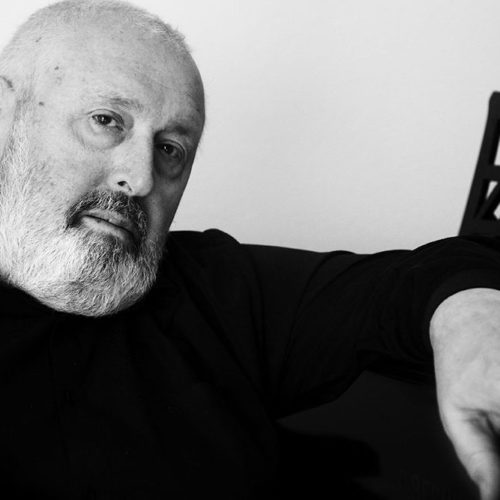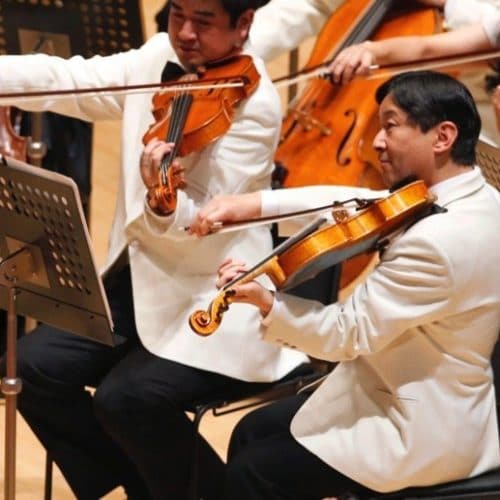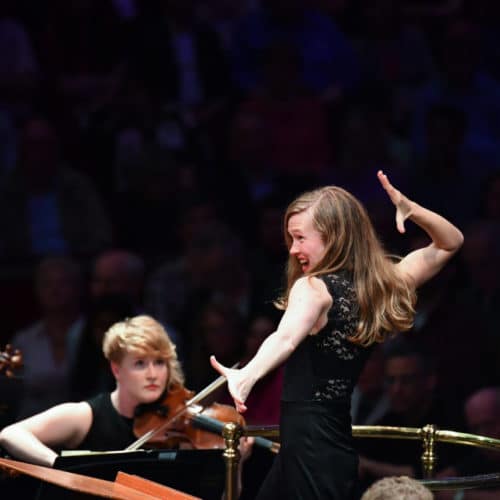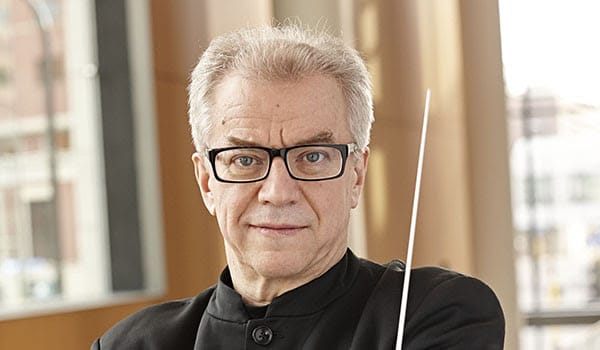The Chicago Symphony Orchestra returns tonight after seven weeks on strike. Our diarist, Chicago to her socks, has been trying to find out what went right, and wrong.
Here’s Anthea’s report:
What function does an orchestra serve in the community? As a Chicagoan, born and bred, I have been following with particular interest the recent events of the Chicago Symphony Orchestra. An orchestra, be it in a small, rural town, or bustling metropolis, is an indicator of the health of that community. Not just the musical health, but the entire ecosystem from commerce to education – it is one of the keystone species of its home town.
‘A keystone species is an organism which has a disproportionately large effect on its natural environment relative to its abundance,’ according to Wikipedia. Think the wolf at Yellowstone, the sea otters of the kelp forests. Although these species are not necessarily the strongest in the ecosystem. The keystone in an arch isn’t the strongest stone – it is strategic, and without it the structure collapses. All other parts of the community are directly and permanently affected. The members of an orchestra are the professors in the region’s universities – they teach privately, sit on competition juries and serve as soloists for the farm-team orchestras. Their spouses and families play roles in the community – teaching at the public schools, playing in lesser orchestras or chamber groups, or simply by being megaphones for the orchestra (often the families live in the suburbs, further spreading the influences). Their kids go to Eastman to study music, becoming performers and teachers themselves. Local businesses are affected – from the service industry to tourism. The pay scale represents the size and importance of the city – just like in sports. The biggest cities need to pay the most in order to attract and keep the highest levels of musicians.
When I was growing up, my parents had a Wednesday night subscription to the CSO. That meant babysitters for me and my two older sisters, and stories during the week of what was played (that music would be wafting around the kitchen while meals were being prepared). We all learned those pieces, got dressed up and went downtown to the concerts on occasion – pointing to the musicians we knew in the orchestra, waiting by the stage door to catch a glimpse of our heroes. They were our teachers, our coaches, the people playing in the local chamber music series. And they were ours.
Later, as I began to make a name for myself and to have actual, paying concerts, I would have the opportunity to invite a member of the orchestra to be a guest with my quartet or trio, or to teach with me at a festival. One such person was the incredibly poetic and engaging John Yeh, who has been Assistant Principal Clarinet for the CSO since the tender age of 20. I have played nearly every possibly chamber work with him – from the trio version of L’Histoire to Mozart Quintet -eventually recording works of Hindemith for the Cedille Records, a Chicago-based label. He is all around town – from founding the Grammy award-winning Chicago Pro Musica to teaching at summer camps and coaching the local youth orchestras. He is a friend and mentor to the Chicago musical community, and I was able to catch up with him this week to get an insider view of the recent events. Thank you, John, for taking the time to show us what it feels like to be a musician inside this cultural keystone. You are a treasure to Chicago, and to the entire classical music world.
Anthea: Can you please give us a summary of the recent events?
John: Yes. On Saturday, April 27, 2019, the Musicians of the Chicago Symphony Orchestra ratified a 5-year agreement with the CSOAssociation. This was following a nearly 7-week strike, which began on March 11, 2019. This was the longest strike in the 128-year history of the CSO. The strike was precipitated by the refusal of the CSOAssociation to propose a fair contract with the musicians. The strike went on for so long because the CSOA failed to come to the bargaining table to negotiate in good faith. They attempted to impose a sub-standard contract on the musicians, which we overwhelmingly rejected. Then they kept canceling weeks of our season without any attempts to improve their contract offer. It was very discouraging to view our management and our board in this way. They thought nothing of the damage their behavior would wreak on the great institution.
Anthea: There was a lot of local and national support – what did that feel like?
John: This was one of the silver linings to the dark cloud! We have garnered such an outpouring of support and encouragement from so many communities worldwide. The vast public support we gathered during this extended strike was what allowed Mayor Emanuel to finally step up and mediate.
Anthea: What were the darkest days?
John: The darkest days were when the CSOAssociation refused to engage with the musicians in any meaningful negotiation. This showed their true colors. We will have a lot of healing to do.
Anthea: How secure do you feel now?
John: We feel secure for the time being, and are happy to return to the stage of Orchestra Hall with our dear Maestro Muti this week.
Anthea: Are you wary?
John: Yes, more than ever. We have seen how the ideological agendas of a small minority of the Board of “Trustees” can wreak havoc on the bedrock of a great cultural institution.
Anthea: Does this experience change the way you think about the future of musicians in the states?
John: Yes. We must all continually stand together with our brothers and sisters in other orchestras who may have to endure this sort of onslaught from union-breaking entities who have infiltrated their boards and managements.
Anthea: When you sit together as an orchestra on stage again, what will be different?
John: Every time we sit together on stage, the Chicago Symphony Orchestra experiences a sense of unity, collaboration, and sensitivity. Now, our sense of solidarity has become strengthened and even more unified. This is another great component of the silver lining to the dark cloud of the strike we have all endured together.
Anthea; What has changed in your heart or mind?
John: We are more resolved to resist any attempts to degrade our standard. We will now take steps to facilitate the removal of forces that would act to cut us down.
Anthea: Does the music mean something different?
John: Yes, just yesterday in a Chicago Symphony Winds concert at the University of Chicago, we had an amazing experience of playing for a most appreciative public. The music went out like love and telling a story of strife, unity, strength, dedication, beauty, and magic. I think each and every adversity we experience as deeply feeling musicians serves to enhance the communication we bring to our audience on a profoundly deep level.
Anthea: Were there some people who just didn’t get it?
John: There were some that didn’t get it, some of the public who didn’t know the complete story, or the history of our institution, of the need to honor our predecessors as well as our successors.
Anthea: What role did the Mayor have in the outcome?
John: He stepped up at a crucial moment, not a moment too soon, to mediate a settlement. He very clearly understood the damage being done to the city of Chicago by this work stoppage. He was instrumental to bringing our management back to the table for meaningful talks. They couldn’t ignore him, as they had ignored even their own subscribers, their own patrons, and their own musicians.
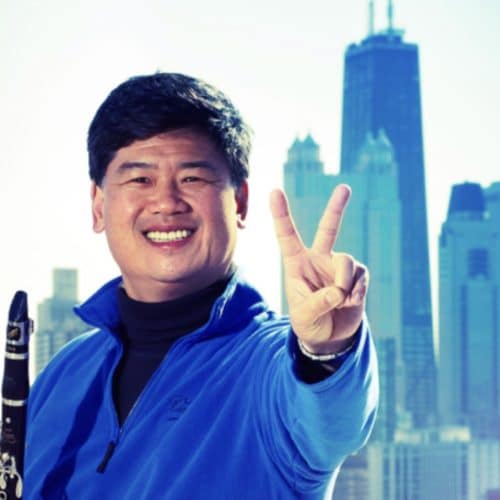
The Australian pianist Shuan Hern Lee has asked us to share his response to being evicted from the Lang Lang piano competition in Sjenzhen this week, as detailed previously on Slipped Disc. It takes the form of an open letter to a jury member.

Letter from Shuan Hern Lee:
Dear Maestro Pompa Baldi,
I’m very upset for what happened in ShenZhen.
I found it deeply saddening to read your article on Slippedisc.com, especially when its from someone I truly respect. It was only after reading this article, that I have fully understood what has happened. Unfortunately, for us all there was a huge amount of miscommunication and misleading information from the committee.
To be very honest, I entered this competition only because I believe in and trust the professional opinion of you, as well as a few other international jurys’ reputation. Therefore, we trusted its higher and more reliable level of fairness, thus, deciding to enter my first international competition in China. It was totally unbeknownst to me, that such things would actually happen, from the committee and organisation. I have heard and experienced last minute rule changes in the past, on the scene of international contests, but this was not only a simple rule changing problem. None of this would have happened if we were told that before the final round, we were only allowed to play 2 pieces.
You are probably extremely surprised to find me acting this way in this week’s competition, and you may think of me as a very arrogant person because I seemingly did not want to leave out the third piece. I am very sorry if I have offended you and the other jury members in this way, as I have never intended to break things up like this. I sincerely apologise solely to you and to the jury members for any disrespect caused. However please understand, that all this could have been avoided, if it were not for the committee’s heavy lack of clear clarification of rule changes.
Personally, I do not support the idea of last minute changes in rules. I believe that the majority of competitors are like me, studying the rules and regulations very thoroughly, before deciding whether or not to enter, and what repertoire to choose. This is because competitors prepare for months and years, just to compete in less than a handful of international competitions. Changing of rules at the last minute can sometimes be very unfair for certain competitors, as each competitor uses different tactics or strategies in every different competition they enter. If a last minute rule change, unmentioned in the original regulations, applies to all competitors, it may still cause certain competitors’ strategies to be disadvantaged.
However, my frustration with this competition, does not lie within the fact that the rule changed at the last minute. If the rule changes had been clearly stated to me, even at the last minute, I would most definitely have obeyed. Even if you have been told, or think that what I state in this letter is untrue, the things that you have heard from the people around you and the organisation, may not be the same as what the committee have informed me. I really do not know if you have been told false accusations, from the organisation and committee or from other parties, but i can fully assure you, that we have not spoken a single ‘untrue’ word within this whole issue.
First of all, we were not informed that every competitor will be playing only the concerto and the chinese piece, and that the third piece will be definitely excluded, in the final round. Below, for proof, is the entire conversation screenshotted from WeChat, that the committee and my mother had. (It will be better if you could find a few chinese people who have good English translation skills, who are not from the organisation, or have anything to do with the competition, to translate this.) What you will see, is the last conversation we ever had via message, with the committee.
I agree to what you said about this being strange, sad and seemingly absurd, and I am honestly sorry that we all feel that way. But please read the clear reasons behind why I behaved like that. ____________________________________________________________
This is the translation of the conversation:
29th of April 2019
6:54 pm
Committee: Tomorrow’s junior group arrangement:
The competition starts at 9:00 in the morning. Tomorrow morning, please gather at the North Gate at 8:15 and sign in at 8:30.
Performer playing order
First: Concerto
Second: Chinese works
If there is enough time, you can play more
7:08 pm
Us: Do we have to follow the order? We would like to play the chinese piece first, and then concerto? Is the remaining time still included for our 25 minutes performance? Or is it because of too many competitors so you cut the time short?
8:11 pm
Committee: Juries decided.
(At this stage, they did not directly answer any of our questions at all.)
8:22 pm
Us: But there will definitely be 25 mins for everyone’s performance right?
Because when we first enrolled, We asked few times, and the rules said that the performance order is to be decided by ourselves. But for now order is not important. Will there definitely be 25 mins for us to play? They wont stop us before 25 mins right? Otherwise wouldn’t that be unnecessary to ask us to prepare the last piece in the first place? Please confirm this. Thank you.
(We asked so many questions, because we needed to know whether or not to still practice Prokofiev toccata for the next day. If they did not state, ‘If there is enough time you can play more’, we wouldn’t ask all these questions.
8:36 pm, we tried to call them, in order to clarify this issue, but nobody answered the call.
Us: We are hoping that the committee will not change the rules at the last minute. (We were really hoping to communicate with them.)
(After one hour we still did not know what to practice for the next morning.)
9:45 pm Committee: We did not change the rule. It’s just that the Jury members had a meeting and decided. (What did they decided? They did not state.) Because the chinese piece and the concerto, is important for the prizewinning decision, therefore, we need to listen to it first. (They still did not say that the third piece is canceled.)
9:50pm
Us: Program order of the pieces won’t matter. But would like to know if we still can have 25 mins to perform? As long as they won’t stop us before we reach 25 mins.
Committee: Whether or not the bell rings, is up to the chairman of the jury.
(At this stage, they still have not answered our questions, and did not tell us that we were only allowed to play two pieces.)
9:56pm
Us: Did the rules state that(the jury could cut us off within the 25 mins)? (Quoted the repertoire section in the rules, that every performance was maximum 25 mins) So does that mean that you shortened the competitors performance time and changed the regulations? If you ring the bell after the 25 mins when the competitor is still playing, there is no problem. But we do not think it is very fair to ring the bell before 25 mins, because in your regulations, you stated that everyone had a amount of 25 mins to perform.
(At this point, we asked all this questions because we did not know that everyone had to play ONLY 2 PIECES. We only thought that it was calculated by the jury chairman’s (one person) preferences. We also thought clearly that it was calculated by time, not by the sheer amount of pieces.)
Committee: Competitor parent. You can contact the chairman of the jury personally and discuss this matter. We are only in charge of notifying the competitors. (This is a very unusual request. Although we do not understand why they want us to communicate with the chairman of the jury directly.)
Us: Is it possible to communicate with her? (We try to follow the committee’s instructions to clarify the matter.)
10:02 pm (We felt that this was becoming more confusing, and that we needed clarifications urgently. We needed to confirm this, so that we can mentally and physically prepare for tomorrow’s repertoire. Our competition was scheduled very early in the next morning, and it was already turning late by this point of our conversation.)(Please note, we are foreigners in China, and there is no access to pianos around us to practice in the early morning. Therefore, in the next morning, we only have 20 mins before we go on stage. We really needed to clarify this desperately so that we know what to practice beforehand.)
Us: If so, please give her(the chairman of the jury panel) contact to me.
We have entered more than 10 country’s competition. We have met with situations where organisers enter more finalists than the amount planned. But we have never met with situations where the organisation shortened finalist’s repertoire time, due to the extra numbers of finalists. Changing the time in such a last minute manner, is not fair, and not following regulations.
Because competitors choose repertoire according to repertoire time. Whether it is 20 mins or 25 mins, will have totally different repertoire. We totally understand if you bell us to stop after 25 mins. But to stop us before 25 mins, is not right. We have entered 30+ international competitions. Including Tchaikovsky, Cleveland, etc, but to be this last minute, and to change the time limit, is our first time. “If there is enough time, you can play more” what does this mean? Do these kind of things only happen in China?
No matter what happens to the results, if the committee does not follow even its own rules, it is very disappointing. (The reason we said this, is because if we knew in advance that we would be solely judged on the chinese piece and concerto, and not the third piece, we would have chosen a much harder chinese piece, instead of ‘Sunflower,’ a simple 2 minute piece. I think it is very normal for us to think that this change might affect the result. We became more asserting, because we really wanted a solid answer, and clarifications like ‘yes’ or ‘no’, which in the end, we never received.)
10:08 pm
Committee: The things that you say, we will pass on. However, we never said that we would cut short the time limit. Only that for this competition, these two pieces are the most important, and should be listened first. These few days, there have been many contestants that just played 20 mins. Sometimes, they even went over a bit, and we did not stop them. We are humans not robots.
(This was one of the most misleading part of this conversation. It sounded to us as if, we were allowed to play all three pieces! If other contestants did not get stopped exceeding the time limit even by a bit, we should be fine! Because our repertoire is definitely under 25 minutes!)
10:15 pm (However, by now, we still had a hunch that they were going to shorten the time, therefore, we really wanted to make sure that the hunch is either right or wrong, as they still did not directly clarify at all.)
Us: Originally there was supposed to be only 6 people entering the finals. In the end, there was 10. We have no problem with that at all. But cutting the time limit, changing the rules, has a big problem. If we had known that there were only two pieces, we would have chosen another piece.(instead of sunflower) Competitor’s repertoire and choice of pieces will always be based on the time limit. The choice of pieces or repertoire will definitely affect the result. If we were stopped within our given 25 mins, we will definitely make a complaint. Hope you communicate with the jury chairman, before the finals begin, in order to avoid unfairness.
Whatever order of the piece, we do not mind. (As long as we get 25 mins to perform)
Committee: Then you guys can follow the jury’s decision, and perform in order. Regarding to your concern, we will pass it on.
(We have tried asking questions, probing answers, to no avail. Not even a single ‘yes’ or ‘no’ has been established at this point. What was the jury’s decision? It was never clearly stated. So by this stage in our conversation, we thought that we could play 3 pieces, just that they might cut us off at a shorter time limit than 25. However, unfortunately, we were heavily mislead by the committee and we guessed wrong.)
Us: But the rules of a system or a game, cannot be changed on the spot. If a game is like that, who will dare to play it? Please pass the message on urgently before the finals.
(We immediately quoted and sent the picture and from the rule no. 3.) “Competitiors should play from memory. Order of performance should be decided by competitors themselves.”
Actually you have changed two rules, our chinese piece is only suitable to play as the first piece.
(They did not reply whether if our statements and questions were correct or not. After this, we did not get any more messages from them, and nothing they had said, clearly stated that anything was confirmed.) ___________________________________________________________
On the day of the performance, I still practiced the toccata,(3rd piece) in the morning. When we arrived there, and we asked one of the organisers in the front desk, “We actually have some concerns, about what is going to happen today. You know that we had a discussion last night about the repertoire. What was the final decision?”
Very arrogantly, the chinese lady in the white dress, smirked and said “If you have any problems, you can talk to the jury now, while the jury is walking off during the 5 minutes break!”
By entering so many international competitions before, we knew we are not supposed to talk to any jury members before the competition ends. So we did not approach the jury members, even if we were completely able to, and we followed competition rule no.5, which is normally the same rule in the majority of all international piano competitions. Until now, we still do not understand why the committee pushed us to talk to the jury members directly even before the competition ended rather than simply stating the change of new rules. (First in WeChat, and the second time in that instance.)
As I went backstage, I immediately consulted a lady there who was listed as part of the committee members. (Whose name I do not want to reveal in public, although I would be more than happy to send you her name privately, from the back pages of the competition program, under the heading of ‘committee members’.) I asked her, if it was acceptable to perform the Sunflower first, Toccata second, and then the Rachmaninoff 3rd concerto. I wanted this order, so that the jury members, can hear all of the three pieces, and if there was not ‘enough time,’ in case, they could cut off the ending of my concerto, which I would much rather. At that time, I was only thinking that the time may be shortened, not knowing how much I was mislead.
Please understand, that if I knew, that everyone could ONLY play 2 pieces, I would
never have performed my Toccata, and I would never even ask the committee member this question. She answered, “Yes no problem. It’s fine. As you wish.” This was the first clear clarification I have ever received regarding this matter from the organisation.
During my performance, after I finished the chinese piece, I was surprised to hear the bell only after few bars of my toccata. I thought, “I hadn’t even reached 4 mins of my performance, and they tried to stop me.” I hope you understand and can see from my point of view, that under that stress and confusion, left from the night before, I chose an extreme choice. I was completely not aware that they only wanted to hear the two set works; the concerto and the chinese piece, and that the third piece was completely unnecessary. However at that exact instance, I did not think it fair, to stop my performance only at 4 mins, so I continued and went on, and decided to successfully finish my toccata, then to stop. Maybe in another time, in another situation, I would have stopped straight away. But I must clarify one thing. At that time, my actions and choice not to stop, was purely out of confusion that was caused previously, and it had nothing to do with anything else, such as disrespect, arrogance, etc. I apologise if it was viewed as anything other than that.
Previously, in many competitions, there will be bell rings, and that is completely normal, as long as it is stated from the beginning and in advance, in the rule. For example, I competed in Gina Bachauer, competition heats, and they wrote many months beforehand in the competition regulations, that in the heats, they would actually stop me with a bell ring, when they have heard enough. This, I have also experienced many times in other international auditions and competitions. All these years, I have followed these rules to the end. I can once again assure you, that my actions did not stem from arrogance or lack of humility.
———————————————————————————————
We have fully expressed our concern to the committee the night before the finals. We do not think we have spoken or written aggressively. We do not believe that we were wrong to fully communicate and share our concerns with the committee. However, the committee ignored us in the end, and never clearly spoke about the new rule changes. I’m not sure what the committee told you about what they notified us. But there was certainly no sentence saying ‘we will only hear the two pieces and the third piece will not be needed’ at all. My point, is that what they had told us, was extremely vague, as you can see, and that it was never even close to coming to a clear conclusion.
About “Having heard nothing further, we thought that Shuan Hern begrudgingly accepted this request” as you can see now, is not true from the evidence of our conversation. It would be more factual to say that the committee arrogantly disregarding our continuous spamming of questions and requests to clarify things. We were the ones sending the last message, requesting clarification, and not receiving any. We never even had any clear statement in detail about the new rules.
Moreover, why did the organisation, on WeChat, post that my mother and I had ‘on multiple occasions tried to contact the jury members privately before the competition and broke rule no.5’? This is not true at all. Do they have any solid evidence? You are probably the only person that I’ve met most, (3 times in my life, all under strict competition circumstances) on the jury panel. The last time I even talked to you and Maestro Slutsky was in E-piano 2 years ago! Other than that, I have never said a single word to any other jury members on the panel before.
As you may know, I have entered many international piano competitions, and few of which, the jury may change the rules, etc. But, the problem does not lie in that. The problem, lies in the confusion that the organisation and committee’s communication causes. If the new rules were clearly reinstated, we would not impose or question them of rule changes, because in that case, we would have known that the finals performance duration, is calculated by pieces and not by time limit, which will be quite fair for all competitors. In comparison to having the chairman of the jury solely choosing when to stop us during the performance, as we were clumsily explained to, by the committee.
Regarding to, “This disrespect continued afterwards on social media, where he started spewing venom about how this was a sort of conspiracy to deprive him of the chance to win.” I would like to ask you if you can ask the committee to prove this from our WeChat posts? All we were saying was that we did not care about the prize, as we wanted the fairness and the respect, but that is because we did not know the new rule, until we read your letter, as we thought we were mistreated by the whole competition. There was absolutely nothing about depriving me of the chance to win, and would be more than interested if the committee would show us any evidence of this.
In conclusion, I hope you understand, that I am not acting as an arrogant person, or an angry complainer. I had no idea that the jury members were told that all the competitors have already been notified to ‘play only two pieces’. After reading your letter in Slipped- disc, only then did I realised that this situation was nothing more than a victim of circumstances, or misleading information, which could have been easily avoided by the committee members. I meant absolutely no disrespect to the jury panel, and what I did on stage, was definitely not out of arrogance and disrespect, to you or the jury panel. Rather, it was out of confusion. I honestly did not hear the chairman or anyone’s voices, above noises of the audience and the piano. I apologies profoundly. Nevertheless, all that I am humbly and simply requesting now, that we clear this confusion up together.
To be honest, It really hurts me in the heart to see such competitions like this, where people can see that the way the committee communicated with us, was in a very unclear and misleading way. I think that because of this, it is perfectly normal for the public to be suspicious of the committee.
Moreover, I realise that I will be under a lot of media attack, from showing in this letter that the committee is wrong and questionable in their actions. However I just want to state, that in order to establish a fair, transparent and successful competition, the committee, has to be able to give the exact same, and extremely clear instructions, rules and regulations beforehand, especially for last minute changes, to both the jury, and to the competitors, in order to avoid miscommunications and confusions like this.
Nonetheless, I strongly agree with what you said about talent and ability and should go hand in hand with humility and kindness, and I will continue to strive for this in life. However sometimes, things around you can take the matter out of your hands, and swirl and twist it too far, thus completely blotting out the real reasons behind your actions in the first place.
This letter’s only motive, is to clarify this situation. I whole heartedly apologise solely to you and to the jury members, for reacting in an extreme way. Regretfully, I must strongly state, once again, that none of this would have happened, if it were not for the organisation and committee’s poor and incompetent communication skills.
Thank you very much for your time and understanding. Yours sincerely,
Shuan Hern Lee
